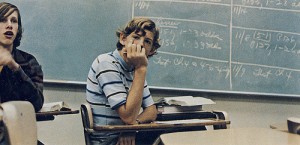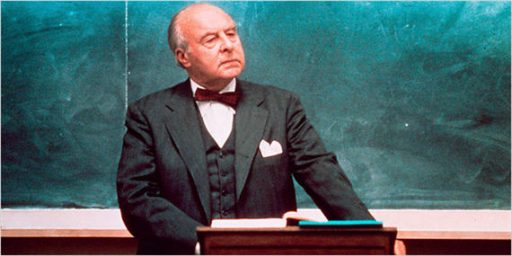Cramming for Exams Not Working Hard
 Joining the College grading expectations debate a little late, Alan Jacobs makes a point most of us glossed over entirely: even if we decide that it matters how hard the students worked matters, how would we measure that?
Joining the College grading expectations debate a little late, Alan Jacobs makes a point most of us glossed over entirely: even if we decide that it matters how hard the students worked matters, how would we measure that?
Monitoring students on webcams to see how much time they spend writing, or with their noses in books? Even that wouldn’t let me know how much of the time they’re really concentrating and how much daydreaming. Have then hooked up, then, to constant brain-scanning devices, so that I can see what parts of their brain are active, and how often?
More interesting, though, is the bottom line:
That would help a lot, but short of that, I think the only option — and as far as I can tell this is the one that many students want — is for the students themselves to decide how hard they worked. But if we’re supposed to give them grades based on how hard they worked, and they’re the ones who determine how hard they worked, then they’re basically grading themselves. Now that would be a dream come true for me as well as for them, but it’s not really a workable solution. Especially since most students I know have one real criterion for determining how hard they work on an assignment: how late they stay up the night before the assignment is due.
Quite so.
Yes, there are students in every class — especially survey courses taken by non-majors — without the aptitude to master the material. There are far more students, though, who simply have no concept of what it means to do the required work.
It’s also true, admittedly, that the converse is true: Many students who get good grades don’t work all that hard, either. Rather, they have a natural aptitude for the material and/or test taking. Or they can pull an all nighter and crank out a paper that’s better than most of their peers turn in.
Photo by Flickr user foundphotosli under Creative Commons license.






Here again we brush up against the cocncepts of equal opportunity vs equal outcome.
How would it matter, if the student tried really, really hard, if he just didn’t make it? How is that different in terms of passing the course, than someone who just didn’t care?
I mean, unless we’re trying to equalize outcome, based on a valliant at passing the course….
If I hire someone to do a job and he tries really, really hard to get it done and fails… I’m going to fire him. If I hire someone who gets it done effortlessly and then exceeds the parameters I’m going to give him a raise. We pay people for accomplishment, not for effort.
Why should grading in school be any different? Isn’t school supposed to be preparing them for life? The purpose of a class in botany is to teach about plants. If a student learns nothing about plants, he has failed in the purpose of the course and it doesn’t matter a bit how hard he tried in that failing effort.
The grading system should measure the degree to which the purpose of the course has been accomplished, and that purpose has nothing to do with the amount of effort expended.
Bill H has it exactly right. At work there are a lot of jobs and different ways to measure them. Some easier than others. If you are on a production line, your productivity can be counted by the number of widgets per hour. That would probably be most comparable to something like math where there is or is not a right answer. If you are in sales, your productivity is based on sales made at what price. This is probably closer to something like programming where lots of work can go into something and nothing useable comes out. If you are in marketing it is much harder to gauge productivity. You can count conventions, ads placed, and the broad gauge of market share, but it is much harder to gauge daily productivity. This would be closer to your political science course.
Ignoring the question of social interaction (which may loom large in kindergarten, but presumably is of lesser importance by college), how much of college couldn’t be taught and tested on the web? Here is your reading list, here are some practice questions, here is a video of a lecture and when you are ready, take the test (essay, question, send in your project or whatever). For advance work in a specialty, you may go with the small seminar class with a few students, but the vast bulk of college and high school could be handled this way.
Of course, such a model would break a lot of academic rice bowls, so don’t expect to see it popularized soon.
I’m always struck by the notion that an “all nighter” is an actitivity of merit. To me, it as if someone has offered to write the paper/exam in their own blood. It demonstrates a willingtness to bear that extra burden, though it utlimately is far more explanatory of why the performance was not as well executed as if the burden had not been borne. I believe there are studies supporting the view that sleep is usually better.
I readily admit I have never pulled an all nighter for any test or paper.
I also probably put in fewer hours of study and did better than a lot of my peers, because I retain well what I have read, take/took good notes, and take tests well.
I think effort is hard to measure, and effort isn’t the goal of education anyway-learning and mastering the material is the goal.
This brings to mind several things my brother has said:
First, College is not High School.
Although many snowflakes are well protected by heliocopter parents, calling them students is only appropriate when they learn the material.
Second, College is a Full-Time Job.
Twelve credit hours may be considered full time (15 hours was full time in my day), but that doesn’t count the time outside of class where one is expected to do the readings and work on the homework. That adds another hour to two hours per class hour to the student’s work load.
12 (class) + 24 (outside) = 36 hours of work for a full time student. Thats just like working full time.
Lastly, Prerequisites or Why You are Expected to Learn the Material.
College students are expected to be adults and take responsibility for their learning. After you graduate, you are expected to use the skills you picked up in your classes. Nobody is going to tolerate having to help you review material you should already have learned.
In closing I would like to remind everyone of the methods of my suitemate, TomG, who treated his classes as a full time job and fitted his studies between 8 am and 5 pm every weekday. He did not waste time during his class days, but had plenty of relaxation time in the evenings.
Best of all, he knew the material cold when it came to finals week (as he had been reviewing it all along). This allowed him to really relax the weekend before finals when everyone else was trying to cram in the information they should have spent the past 15 weeks learning.
The thing is, you don’t need their cooperation to make your idea work. As easy as it would be to put the resources required for learning on the web, it is far easier to put the resources required for testing on the web.
Colleges and Universities once existed to provide knowledge, and back claims of having said knowledge. Now, a diploma is just a check-mark on an HR list. If I can gain knowledge on the web _and_ prove that i have said knowledge, in a way that is just as easy for HR to check off, why would anybody need to graduate from a university?
That model is already in play for college (BA and MA) and to a much more limited extent in HS. Even traditional colleges are offering some courses online or as hybrid courses (part online and part in class or lab). From my limited experience the product of a University of Phoenix (or similar) education is well below that of a more traditional college education. Ditto online and hybrid courses from traditional institutions. I am not sure how much that has to do with selection bias vs benefits of physical attendance and participation.
This is not to say that this model does not have some utility, but that the utility is limited.
That second part is the difficulty. Simply testing for certifications with some experience requirement works well in a number of fields. This model could probably be broadened considerably beyond where it is now.